Yupp: How to Break Through AI Accessibility and Evaluation Using a Crowdsourcing Model?
Written by: KarenZ, Foresight News
With the rapid development of AI technology, the emergence and diversification of AI models have left users dazzled. How to choose the right AI model for oneself, how to enable models to accurately capture real needs beyond traditional benchmarking, and how to provide tangible incentives for feedback users have become key issues that the AI industry urgently needs to address.
Yupp was born in this context as an open platform aimed at establishing an open, transparent, and community-driven AI model evaluation platform. As Yupp states, "Compared to any other technological innovation in history, AI relies more on the participation and contribution of everyone to drive evolution."
Last week (June 13), Yupp.ai announced a $33 million seed round financing led by a16z crypto, attracting community attention with a luxurious lineup of investors including Google Chief Scientist Jeff Dean and X co-founder Biz Stone. At the same time, Yupp launched its product, providing users with a window to explore AI and redefining the evaluation and optimization of AI models through community participation and blockchain technology.
Yupp Team and Funding Background
The company behind Yupp is Ber Sarai Labs Inc., co-founded by Pankaj Gupta and Gilad Mishne in June 2024, and has been secretly testing for the past six months. The two co-founders and the chief scientist of Yupp met on Twitter in 2010 and both have a strong background in the AI industry, having worked at companies like Coinbase, Google, and X.
Pankaj Gupta: Co-founder and CEO of Yupp, holds a Bachelor's degree in Computer Science and Engineering from the Indian Institute of Technology Delhi and a Ph.D. in Computer Science from Stanford University. He has served as a technical lead, senior manager of personalization and recommendations, and senior ML staff at Twitter (March 2009 - May 2014), and held positions as Engineering Director and Senior Engineering Director at Google (July 2017 - March 2021). He was also the first employee and site lead at Coinbase India, later serving as Vice President of Engineering and Advisor at Coinbase (April 2021 - May 2024).
Gilad Mishne: Co-founder and AI lead at Yupp, previously worked as a software engineer at Intel (1998 - 2000), a senior scientist at Yahoo (2010 - 2017), a senior engineer and search director at Twitter (2010 - 2015), and a senior engineering manager and head of machine learning at Google X (2019 - 2023).
Jimmy Lin: Chief Scientist at Yupp, researched question-answering systems and conversational interfaces while pursuing a Ph.D. in Computer Science at MIT. He is currently a professor and David R. Cheriton Chair at the David R. Cheriton School of Computer Science at the University of Waterloo. From 2010 to 2012, Jimmy Lin participated in data analysis and data science infrastructure development at Twitter.
This month, Yupp officially announced that the $33 million seed round financing was completed last year. Yupp's capital matrix covers technology, investment, and academia. In addition to the lead investor a16z crypto, other participants include Google Chief Scientist Jeff Dean, X co-founder Biz Stone, Pinterest co-founder Evan Sharp, Perplexity CEO Aravind Srinivas, Cred CEO Kunal Shah, four professors from Stanford University (Dan Boneh, Chris Re, Nick McKeown, Balaji Prabhakar), Othman Laraki, Paul Grewal, Gokul Rajaram, and Coinbase Ventures.
What is Yupp? How Does It Work?
Yupp is positioned as an AI model exploration and evaluation platform that allows users to experience and compare various AI models for free. Its core concept is to conduct model evaluation through crowdsourcing: users submit prompts, compare responses generated by different AI models, select the better answer, and provide feedback while earning redeemable points as incentives. These choices and feedback will be recorded to form data for the later training and evaluation of AI models.
Yupp will also utilize open-access and permissionless technologies such as blockchain, cryptographic primitives and protocols like zero-knowledge proofs and challenge/response mechanisms, as well as privacy-preserving technologies like confidential computing to build a system with provable trustworthiness, fairness, and robustness.
The operational mechanism of Yupp can be summarized as follows:
1. Model Exploration and Comparison: Yupp aggregates over 500 AI models, including ChatGPT, Claude, Gemini, DeepSeek, Grok, Llama, etc. Users can find various AI models on the platform's chat page and conduct prompt tests to visually compare their strengths and weaknesses side by side.
Yupp currently has two pages: a chat page and a leaderboard. The chat page is designed simply, featuring a message box, file upload functionality, model selection options (optional), image upload functionality, and a toggle between private and public chat modes (default is private).
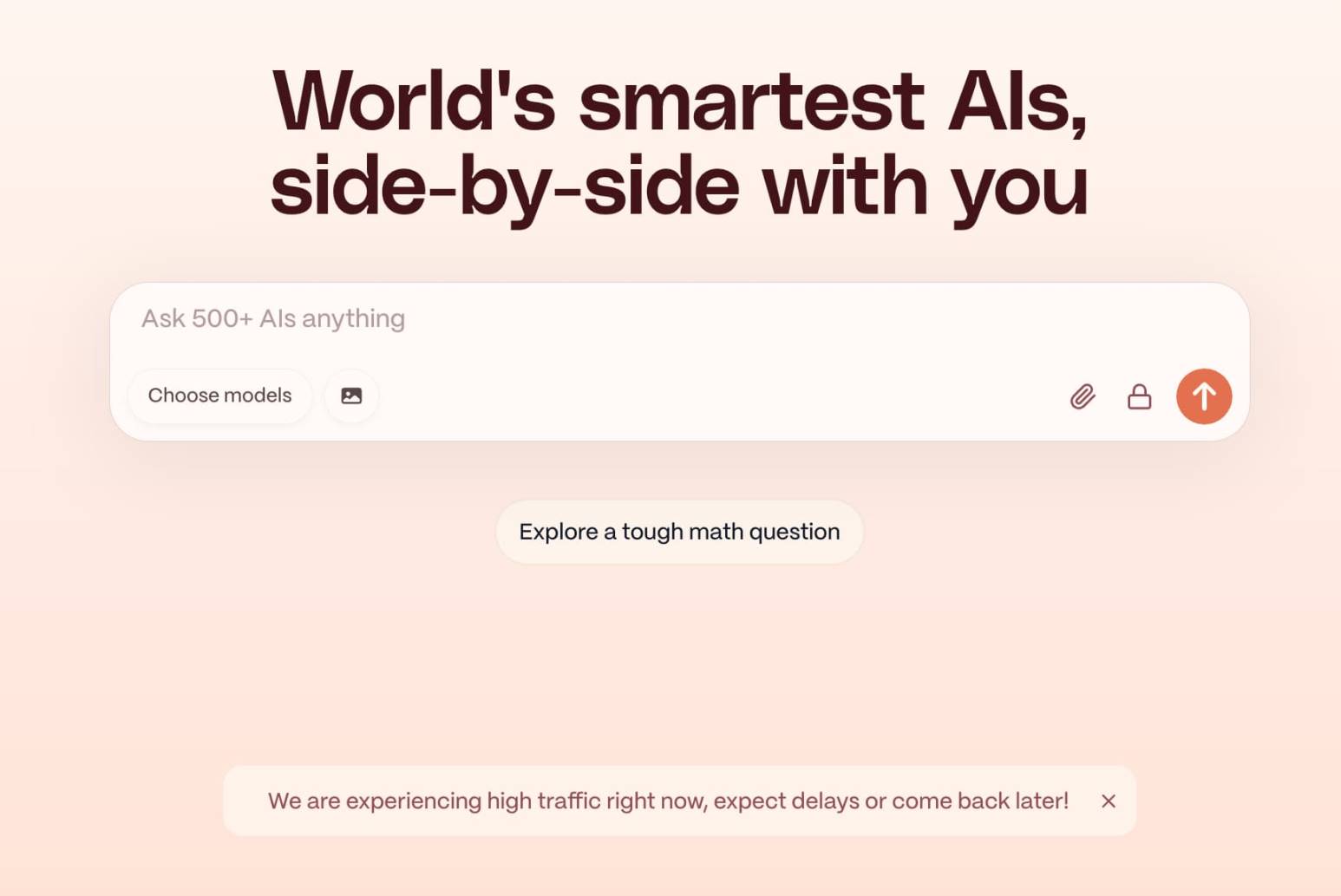
As shown in the image, after asking a question, Yupp provides two versions of AI responses, and the user selects the better version.
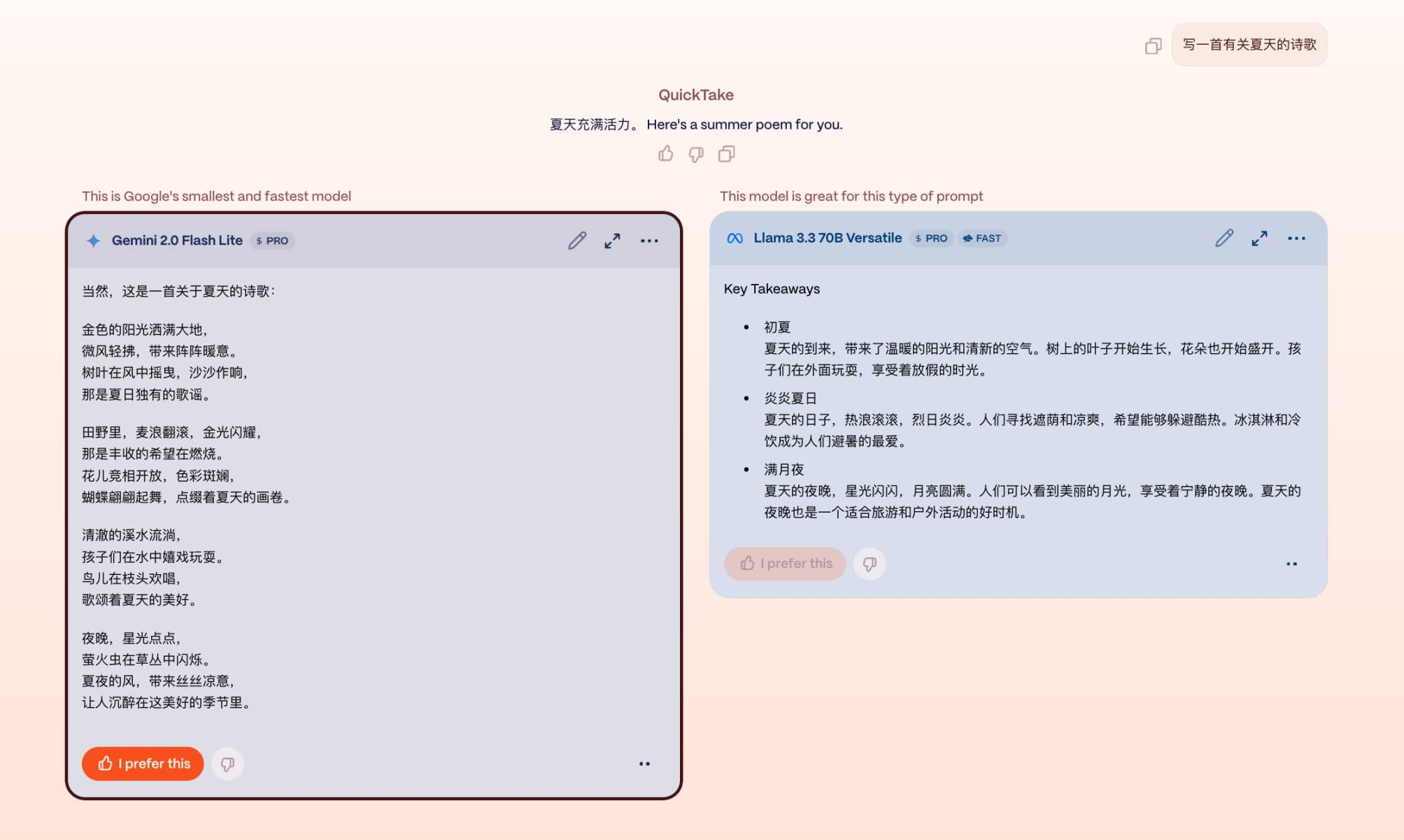
It is worth mentioning that the model is automatically selected by default when asking questions, and sometimes the model name is hidden to collect more objective feedback. Of course, users can also ask questions randomly. Additionally, Yupp's QuickTake AI feature can provide brief summary responses.
2. User Feedback: After selecting the better answer, users can further provide feedback on the answer's quality preference by clicking tags or freely expressing their thoughts in text. This feedback will help users customize future AI answers on Yupp and allow Yupp to provide models for free.
3. Feedback Rewards: After providing feedback, users receive a point scratch card. Points can be used for asking questions or redeeming.
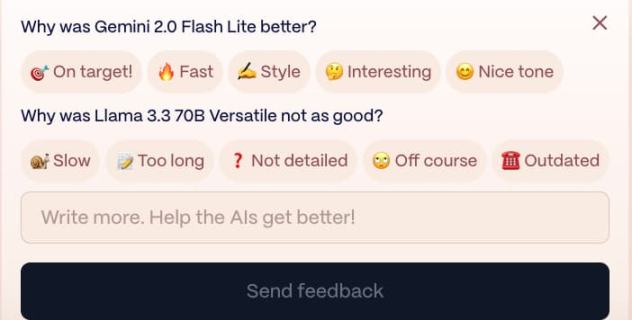
4. Evaluation: By selecting the best response and providing feedback, users participate in the model evaluation process. Yupp aims to establish a publicly transparent evaluation system that allows AI developers to obtain valuable training data while users receive rewards, collectively promoting the development of AI technology. The Yupp platform features a public leaderboard called "Yupp VIBE Score" (VIBE, Vibe Intelligence BEnchmark), which aims to improve model performance using user feedback while ensuring the privacy of user prompts unless users choose to share.
Yupp will create a leaderboard based on user feedback and response speed, among other factors. On the leaderboard, AI models integrated on the platform can be sorted using filters, with dimensions including VIBE scores, confidence intervals of probabilistic samples, voting results, speed, latency, and input/output costs.
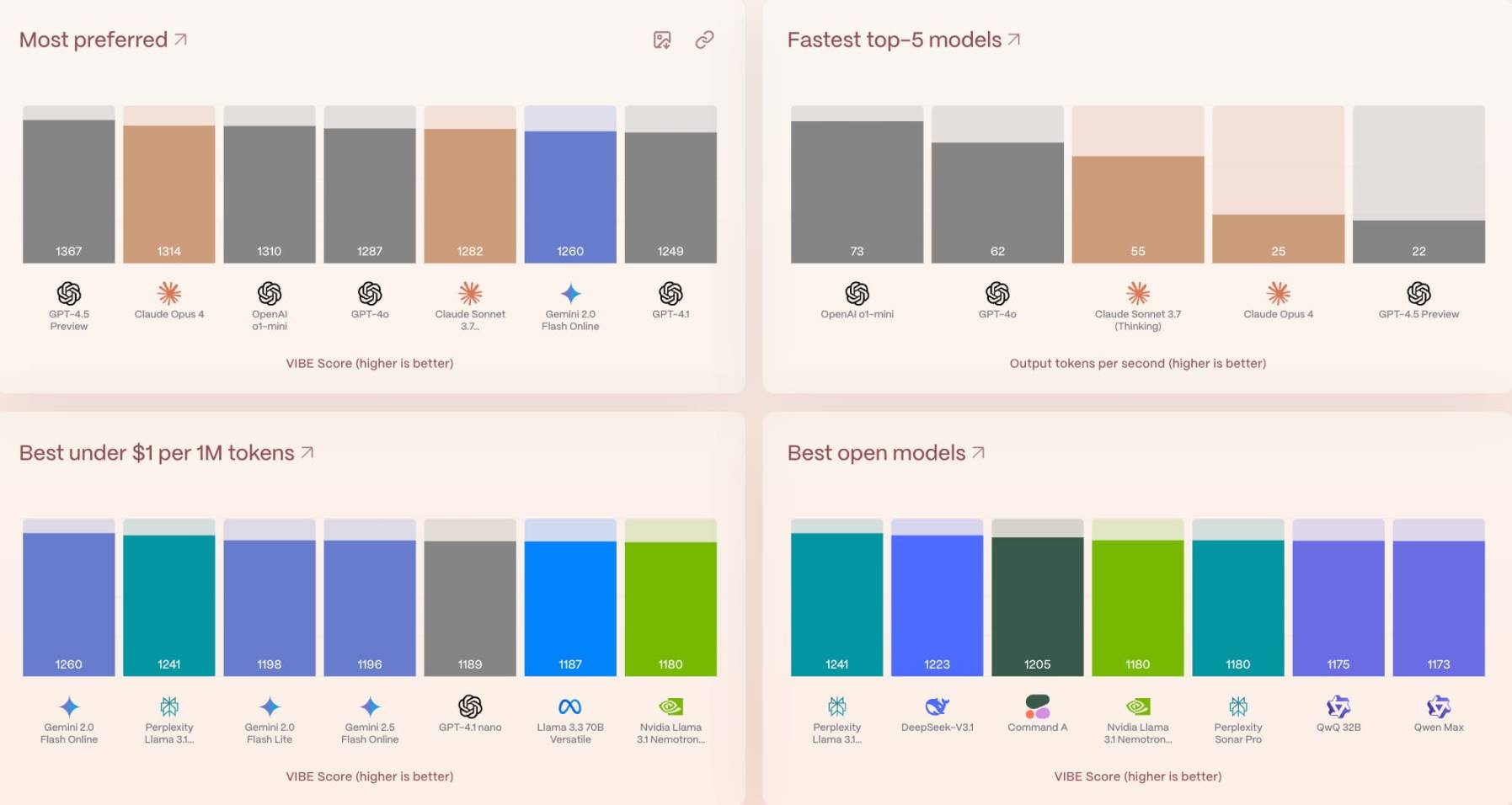
Yupp's AI model evaluation will combine user preference data to segment users and evaluation data in a more granular way, providing samples for AI developers. Yupp states that, leveraging the founding team's experience in addressing spam and bot issues on Twitter, they have developed complex algorithms to filter out low-quality data, ensuring the integrity of rankings. Yupp has also formed a dedicated trust and safety team and will continue to invest heavily in this area.
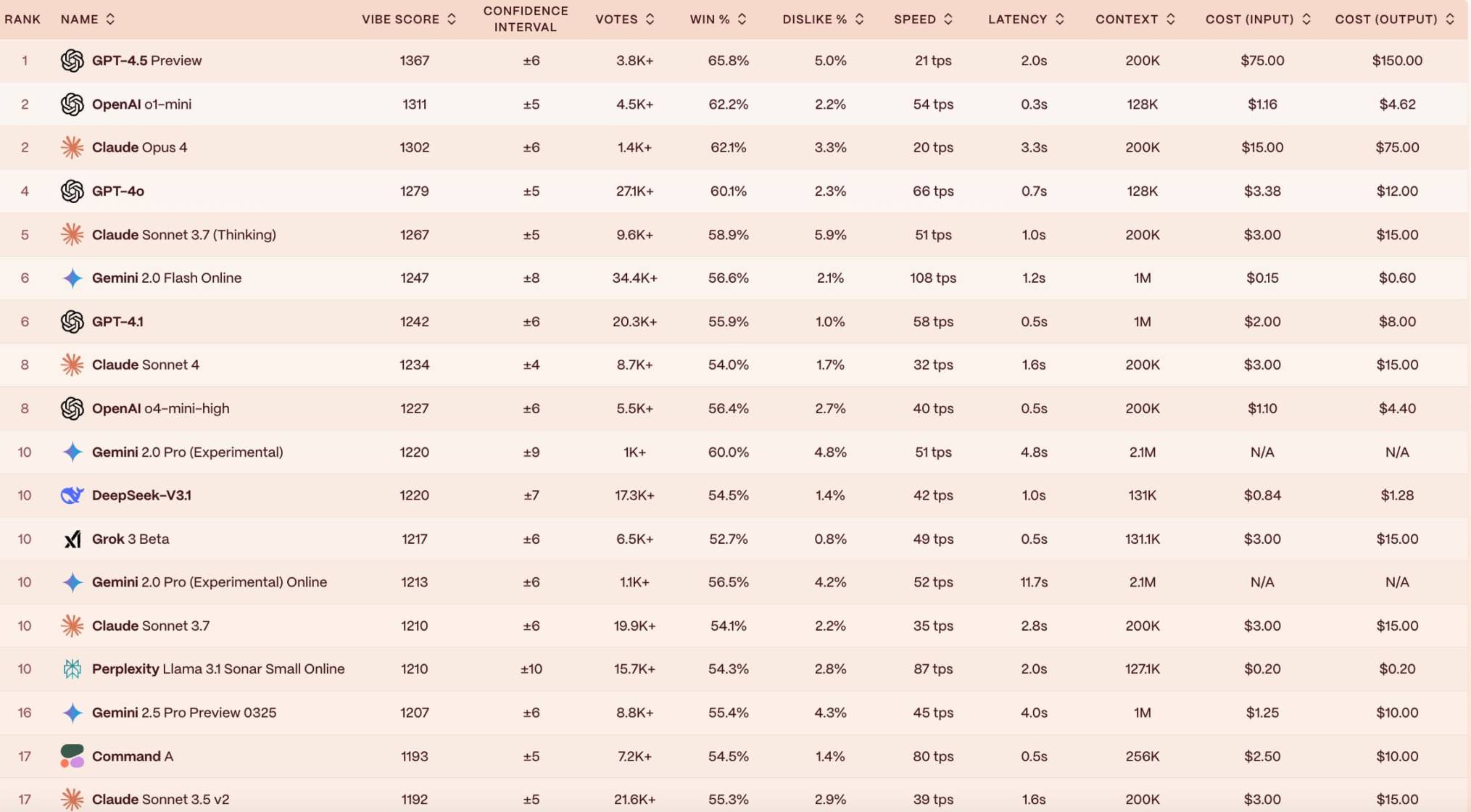
Yupp Point System: Balancing Consumption and Redemption Rules
Yupp points are consumed through asking questions and earned through feedback, with some being redeemable. Yupp states that if users use Yupp responsibly, they will always have enough points to ask AI models and can redeem some points as a token of appreciation for improving the ecosystem.
Asking questions requires spending points, and users receive 5000 points for free upon initial registration. The total cost is the sum of the default fee, PRO model fee, attachment submission fee, and pre-selected image model fee.
Basic Fee: Each prompt costs 50 points by default. If generating an image, the fee is 100 Yupp points.
PRO Models: These advanced models are only available through paid subscriptions on other platforms. If users pre-select a PRO model, an additional 50 Yupp points are required for each question.
MAX Models: These models use the most expensive models. If users pre-select a MAX model, an additional 300 Yupp points are required for each prompt (totaling 350 points including the basic fee).
Attachment Submission Fee: Each attachment costs 25 Yupp points.
Image Model Selection: Each pre-selected image model costs an additional 100 Yupp points.
Additionally, Yupp Q&A is private by default. If users choose public Q&A, they only need to pay half of the above regular fees.
As mentioned earlier, feedback models can earn point scratch cards. The scratch cards I received ranged from 200 to 500 points.
Yupp states that users can withdraw points and convert them into US dollars, euros, Indian rupees, and over 20 other currencies, or exchange them for stablecoins (based on Base and Solana). Yupp has also established partnerships with payment service providers such as Stripe, PayPal, and Coinbase to meet various user needs. Every 1000 points can be exchanged for 1 dollar. However, the cash-out feature is currently unavailable. To prevent abuse or exploitation, Yupp has set the following point redemption rules:
A maximum of 1 withdrawal per day, with a withdrawal limit of 10 dollars (10,000 points);
A maximum of 3 withdrawals per week, with a total withdrawal limit of 20 dollars (20,000 points);
A maximum of 6 withdrawals per month, with a total withdrawal limit of 50 dollars (50,000 points).
Additionally, Yupp stipulates that transactions such as buying, selling, trading, or transferring Yupp points violate the terms of service and will be considered invalid, potentially leading to immediate account suspension. Abuse may result in the disabling of product features or even account suspension.
How to Participate?
The participation process for Yupp is as follows:
Register by logging in with a Google account (registration grants 5000 points; the official statement indicates that using the code "yupp-launch" before June 20 will earn an additional 2500 points);
Ask AI models and choose the better answer between two AI models;
Select feedback tags or provide written feedback.
Use the mouse to scratch the point scratch card to receive points.
Decide whether to withdraw (the official withdrawal feature is currently temporarily disabled).
Summary
As Chris Dixon, founder and general partner of a16z crypto, stated, "Yupp's design transforms human judgment into a sustainable economic resource. As new interactions replace old data, data becomes 'stale,' creating a natural virtuous cycle: more usage leads to newer evaluations; newer evaluations produce better models; better models attract more usage. All participants—from users to AI model builders—can engage and see the same transparent rules apply to everyone, ensuring a trustworthy neutral market. No one can hide the leaderboard, and no one can manipulate rewards or outcomes."
Yupp's slogan "Every AI for everyone" is more aptly translated as "Inclusive AI." Yupp aims to build an "evaluation infrastructure" for the AI era through blockchain technology and a crowdsourcing model: incentivizing users through feedback, providing developers with real data, and ultimately driving AI technology towards a more inclusive and trustworthy evolution.
免责声明:本文章仅代表作者个人观点,不代表本平台的立场和观点。本文章仅供信息分享,不构成对任何人的任何投资建议。用户与作者之间的任何争议,与本平台无关。如网页中刊载的文章或图片涉及侵权,请提供相关的权利证明和身份证明发送邮件到support@aicoin.com,本平台相关工作人员将会进行核查。




